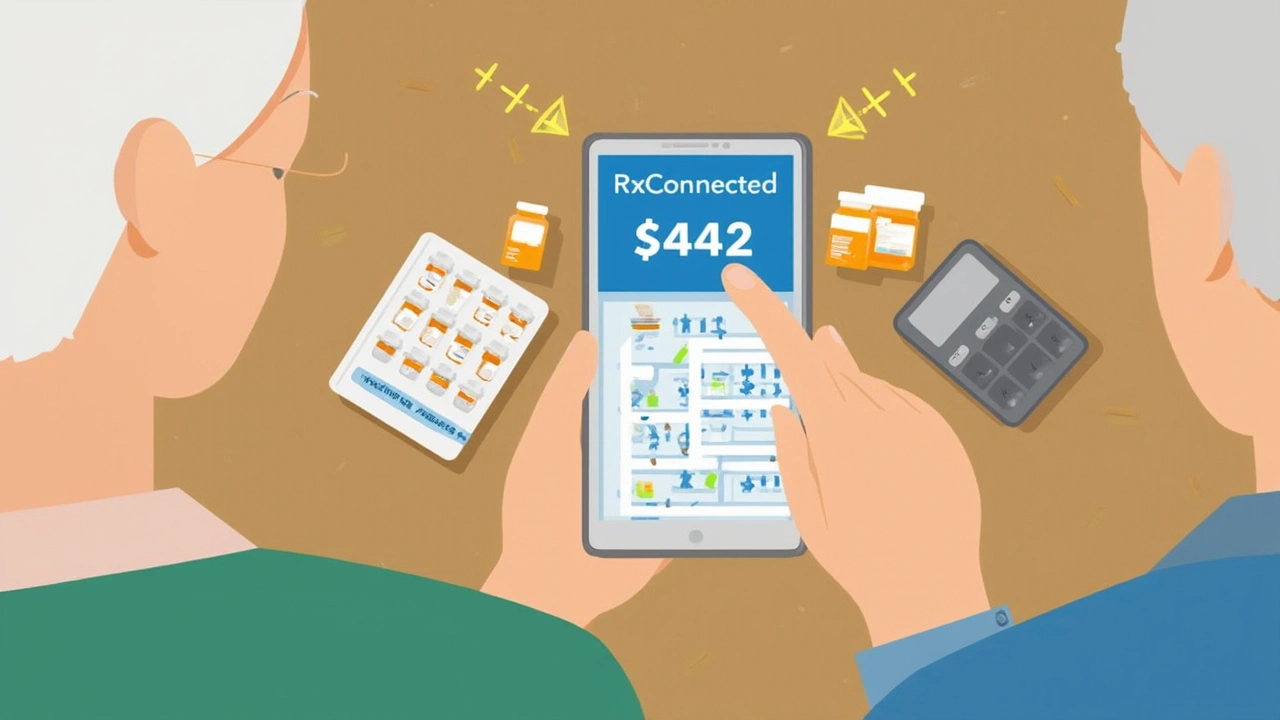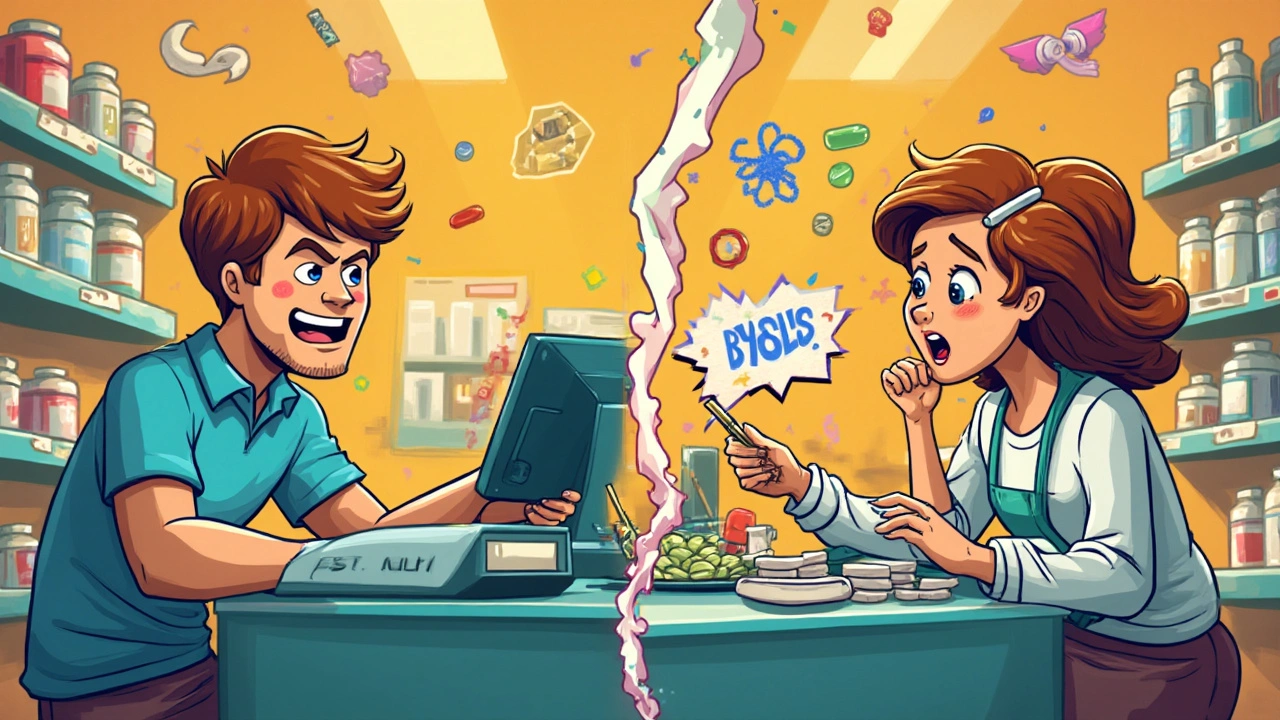RxConnected vs Alternatives: How to Maximize Prescription Savings Today
 Apr, 30 2025
Apr, 30 2025
Why Prescription Prices Vary So Much in the U.S.
Prescription medication prices in the U.S. aren’t just high—they can feel like a punch in the gut. And here’s the thing: even people with health insurance still end up taking a hit at the pharmacy counter. Why? The U.S. doesn't regulate drug prices, unlike most other countries, so prices get set by a strange dance of pharmaceutical companies, insurance plans, and pharmacy benefit managers. It's wild—two pharmacies across the street from each other can give you vastly different prices for the same bottle of pills.
Take generic cholesterol meds, for example—at one U.S. chain, a month's supply might cost you $15, while just a mile away, you'd be paying $40 for the same thing. Branded meds? That's where things get even scarier. In 2023, the average out-of-pocket cost for a popular brand-name cholesterol drug was $170 per month without insurance. No wonder people are scrambling for ways to save. With prices so unpredictable, more and more folks are turning to online pharmacies and international options to avoid emptying their wallets—sometimes saving hundreds or even thousands per year.
The system is designed to confuse, and those fine print details? They can wreck your budget if you’re not careful. Coupons, discount programs, and tiered insurance can help, but even then you need to be sharp. That’s why price comparison matters now more than ever.
The Big Players: RxConnected Versus the Rest
When it comes to finding deals online, RxConnected keeps popping up on the radar—not just because it’s affordable but because it’s transparent about what you pay. There are other major players, though: CanadaDrugs, Planet Drugs Direct, and PharmacyChecker, to name a few. Some focus on price alone, while others offer auto-refill services, prescription transfers, or loyalty perks like birthday discounts (yes, really). The biggest headache? Sorting out whether you’re looking at apples-to-apples comparisons. Some online pharmacies will advertise one price, then slap on $30 in shipping or “processing” fees at checkout.
Let’s spotlight an actual person—Susan, a retired teacher from Cleveland. Last year, she switched from her local pharmacy to RxConnected for her arthritis meds. Instead of shelling out $250 every month, now she pays just $45 (including shipping!) via RxConnected for a 90-day supply. She told me her only regret was not making the switch years ago. Multiply that by a year, and she’s pocketing over $2,400. Those savings? They add up fast, especially if you’re managing several chronic meds.
While every pharmacy has its quirks, what makes RxConnected stand out for many is the absence of surprise fees. Other sites might look cheaper at first glance but—by checkout—you’re wishing you’d read the fine print. Reviews from third-party sites echo this. Customers mention their easy-to-understand pricing, clear shipping policies, and availability of both generics and brand names.

Breaking Down the Numbers: How Much Can You Actually Save?
Let’s get straight to the point: cold, hard savings numbers. People love concrete proof, so here’s a simplified snapshot based on common prescriptions people refill every month. For accuracy, numbers are pulled from real customer receipts, public price listings as of spring 2025, and include all required fees. If you want even more detailed breakdowns, the RxConnected comparison does a fantastic job pitting the site against seven other big online pharmacies. Here’s how annual costs can stack up (all prices in USD):
| Medication | Local U.S. Pharmacy | RxConnected | Cheapest Alternative* | Potential Yearly Savings |
|---|---|---|---|---|
| Atorvastatin (Lipitor) 40mg, 90 tabs | $1,680 | $236 | $220 | $1,444 |
| Eliquis (apixaban) 5mg, 60 tabs | $5,200 | $1,072 | $1,015 | $4,128 |
| Metformin 500mg, 180 tabs | $240 | $87 | $79 | $153 |
| Humira pen (2 pens) | $78,000 | $7,800 | $7,200 | $70,200 |
| Xarelto 20mg, 30 tabs | $6,960 | $1,460 | $1,410 | $5,500 |
*Cheapest Alternative: Among main online competitors (CanadaDrugs, Planet Drugs Direct, etc.). All prices reflect self-pay with no insurance, April 2025.
The difference? Mind-blowing. People managing chronic conditions (and stacking two or three meds) regularly see four-figure savings per year. Tip: Always run your personal pharmacy bill through price checkers before your next refill. And don’t forget to factor in hidden fees and shipping. Sometimes, the upfront price looks identical until late in the checkout process, so getting a full out-the-door quote is crucial.
Surprising Facts and Smart Savings Tips for Prescription Shoppers
Here’s something that surprises a lot of people: In 2024, Americans spent over $630 billion on prescription meds—that’s more than the GDP of many entire countries. The average person between 45 and 64 takes four prescription medications. But there’s good news for smart shoppers willing to look outside the usual brick-and-mortar pharmacy system.
- If your insurance doesn’t cover a drug, or the copay leaves you cold, try ordering a 90-day supply instead of 30. Many online pharmacies, including RxConnected, give even bigger discounts on longer fills.
- Ask about generics every time. Even if you’ve taken a brand name for years, new generics keep hitting the market, and some pharmacies don’t bother to check unless you prompt them.
- Discount cards (like GoodRx) can help if you’re buying from a U.S. walk-in pharmacy, but they almost never beat international sites for chronic meds.
- Always double-check shipping times. While RxConnected ships reliably to the U.S., some alternatives source from multiple countries. Occasionally, a refill might take up to three weeks, so order early if you’re running low.
- Watch for legit-looking but unaccredited sites. It’s tempting to grab the lowest advertised price, but always check credentials—especially if a deal looks wildly better than everyone else. Safe online pharmacies should require a valid prescription from your doctor.
- Pro tip: If your medication costs spike, talk to your doctor about pharmaceutical assistance programs. Some brand-name drugmakers offer direct help with patient costs—often for specialty meds or high-cost injectables.
Did you know? The U.S. pays two to three times more for prescriptions than countries like Canada, France, or Australia. That’s why international online pharmacies are such a game-changer for people who feel stuck—or overwhelmed—by American prices.

How to Get the Best Deal: Step-by-Step Prescription Savings Checklist
If you’re tired of draining your bank account with every refill, there’s a simple process to follow before buying your next prescription:
- Compare Prices: Visit at least two reputable online pharmacies (RxConnected and a competitor like CanadaDrugs) and your local pharmacy’s online tool. Calculate the annual cost based on your usual fill (30 or 90 days and the number of refills).
- Factor In All Fees: Add up shipping, review any account setup fees, and check for discounts (like first-time buyer codes or auto-refill specials).
- Check Reviews and Accreditation: Look for licensing info and independent reviews (Trustpilot and PharmacyChecker are two trusted sources). Avoid any pharmacy that doesn’t require a prescription.
- Ask Your Doctor: If you want to switch to a generic or a different filler (say, capsule vs. tablet), confirm it with your physician first. Sometimes insurance will give grief if you change suppliers.
- Place Your Order Early: Especially with international pharmacies, shipping can take longer. Order at least three weeks early so you never risk running out.
Don’t forget to periodically re-shop. Prices change as new generics appear, supply chains shift, and pharmacy policies evolve. A deal that saves you the most today might be beat in six months.
Did you recently save big? Share your experience with your doctor or pharmacist—they might be able to suggest more ways to save. Healthcare shouldn’t feel like a luxury. By being proactive, checking prices, and staying aware, you can take a massive chunk out of your yearly pharmacy bill. For even more up-to-date price comparisons and provider reviews, that earlier-linked RxConnected comparison covers a lot more medications and includes side-by-side analyses that go beyond just price.
No one wants to pay more for life-saving medicine than they have to. If you’re feeling sticker shock at the counter, remember there are real options out there. As more people share their experiences and demand better deals, it’s getting harder for drugmakers and chain pharmacies to get away with sky-high markups. Shop around, keep your eyes open, and let the savings roll in. Your wallet—and your peace of mind—will thank you.
John Moore
July 18, 2025 AT 15:52This article hits a critical point in healthcare that often goes overlooked: prescription savings. It’s refreshing to see a breakdown that doesn’t just talk savings in vague terms but actually provides numbers and comparisons with other platforms. What I appreciate is the focus on how families can tangibly benefit. Medication costs are a huge stressor, and knowing RxConnected could be a game changer is valuable info.
One question that I have though — how does RxConnected handle rare or specialty medications? Those tend to be the biggest budget busters for many. If someone here has experience using those through RxConnected, would love to hear your insights.
Overall, I think the transparency in their pricing and the guidance to spot hidden fees could save people a lot more than just money—peace of mind is huge in this space.
Adam Craddock
July 20, 2025 AT 10:26I want to jump in and compliment the detailed price comparison chart mentioned — that’s exactly what consumers need in this era of subscription services and complicated billing. Seeing actual figures side-by-side aids in informed decisions rather than guesses.
However, from a formal standpoint, it would be interesting to delve deeper into any contractual relationships RxConnected has with pharmacies and drug manufacturers. Potential conflicts of interest might influence cost structures beyond just wholesale prices. Transparency in this area could elevate consumer trust.
Moreover, touching on the warnings about hidden costs is crucial. Sometimes the devil is in the fine print, and a platform's user interface can either help or hinder awareness of such fees.
Kimberly Dierkhising
July 22, 2025 AT 18:00Reading this, I can’t help but think about the pharmacoeconomic impact of using tools like RxConnected. The jargon around copays, formulary tiers, and discount cards can overwhelm the ordinary consumer. Including tips to navigate these could greatly empower users who otherwise feel lost.
I particularly appreciate the callout about average family savings, because that kind of baseline data helps contextualize the benefits for different economic strata. With healthcare inequities still so pronounced, making prescription savings accessible is a substantial win.
Also, the mention of clever hacks piques my interest. What sort of strategies are included? Are we talking about timing refills or stacking savings? It would be great if the post elaborated on these actionable steps further.
Vikas Kale
July 26, 2025 AT 05:20Hey guys :) Just quickly chiming in from India here — while RxConnected looks like a solid option for the US market, I wonder how their model translates internationally, especially in countries with different healthcare frameworks. The pricing dynamics, insurance involvement, and generic availability vary widely.
From what I gather, platforms like these succeed when combined with robust local pharmacy networks and clear regulatory standards. Does RxConnected plan to expand globally, or are they firmly US-centric?
Also, their ability to warn users about hidden costs is impressive — sometimes those unexpected fees can really stack up if you aren’t careful! Great to see the article addressing this so prominently :)
Amanda Devik
July 29, 2025 AT 16:40OH MY GOD YES THANK YOU for writing this OMG I am literally obsessed with saving money on meds and this article just spells out stuff everyone needs to know.
Seriously, RxConnected sounds like it’s THE answer for people trying to balance health and budget. The part about practical advice and real numbers feels so empowering — like, I don’t have to be a math genius to understand my savings anymore.
One thing that always stresses me out is when you find a cheaper price but then hidden fees pop up—this guide’s warnings could be lifesavers for so many.
Can’t wait to try the tips and hacks. I bet these nuggets will totally change how people approach refills. Big ups to the author for making this topic so accessible and dramatic!
Laura Barney
August 1, 2025 AT 00:13I have to say, I’m skeptical. While RxConnected might look like a great alternative at first glance, there’s always a catch. The pharmaceutical industry is notorious for its behind-the-scenes shenanigans. How do we know these savings aren’t just marketing smoke and mirrors designed to lure desperate consumers?
If the hidden costs are that prominent, why not just be transparent from the beginning? And what about quality assurance? Sometimes cheaper meds mean compromised quality or counterfeit risks. Not willing to risk my health for a few bucks saved.
Anyone else feels the same or have positive firsthand experiences with RxConnected’s legitimacy? I’m torn between hope and suspicion here.
Luke Dillon
August 3, 2025 AT 07:46I want to echo some of the points made here but also add a more personal perspective. Medication costs are a real burden, and having resources like RxConnected makes a tangible difference in enabling people to stick to their health routines without financial strain.
That said, it’s important that users remain vigilant about any platform they utilize. Double-checking prices across multiple sources, confirming with your local pharmacist, and understanding your insurance coverage are essential steps.
The article’s balanced approach—showcasing advantages alongside warnings—really helps in building a nuanced view, which I appreciate as someone who cares about both healthcare access and safety.
Elle Batchelor Peapell
August 5, 2025 AT 15:20It’s fascinating to think about how we value health versus cost. This article actually makes me reflect on what it means to ‘save’ in healthcare—because sometimes cutting costs leads to sacrificing convenience or confidence in medications.
RxConnected seems to offer a way to balance these competing needs by maximizing savings without hiding critical info. The ‘clever hacks’ and ‘practical advice’ mentioned sound like great tools in navigating this complex landscape.
Ultimately, managing prescriptions is not just a transactional issue but a mindset — staying informed and critical helps us make better choices beyond just the bottom line.
Jeremy Wessel
August 7, 2025 AT 22:53Good points all around. I want to simplify the takeaway: platforms like RxConnected are useful, but not a one-stop fix. Users should approach them as one tool in a broader toolkit of cost management strategies.
For instance, pairing RxConnected’s discounts with insurance coverage, manufacturer coupons, and generic alternatives can result in maximum savings. But it requires active engagement.
The article seems to encourage exactly that kind of empowered user behavior, which is what we need more of when navigating healthcare.
Laura Barney
August 9, 2025 AT 02:40@Luke Dillon I appreciate your balanced perspective but I still argue that many people rely too heavily on these services without fully understanding the risks involved.
Blind trust in discount platforms can sometimes lead to medication errors, especially with drugs requiring strict brand compliance. What safeguards does RxConnected have against such issues?
Luke Dillon
August 10, 2025 AT 06:26@Susan Hayes Totally valid concerns. From what I’ve researched, RxConnected offers thorough labeling and requires doctor prescriptions for all meds. They also provide customer support to clarify doubts before transactions.
It’s never foolproof, but the dual approach of user vigilance plus platform checks creates a decent safety net.
Vera REA
August 12, 2025 AT 14:00Hey everyone! As the author, I’m glad to see the thoughtful discussion here. I aimed to present RxConnected as one strong option but certainly not the only path.
The price comparison chart was designed to be transparent with no hidden agendas. Regarding concerns about specialty drugs and quality, I’m looking into updating the guide with more detailed sections on these topics.
Meanwhile, I encourage readers to combine RxConnected with local pharmacy consultations, insurance plans, and the strategic tips mentioned to optimize their savings while staying safe.
Thanks for the engagement and keep the questions coming!